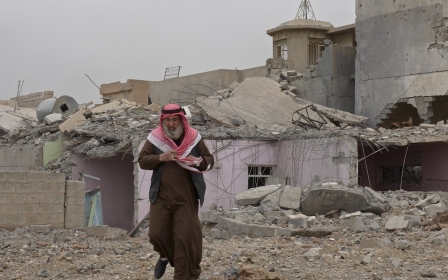Mosul: 'The worst is yet to come,' says UN as 400,000 trapped

An estimated 400,000 Iraqis are trapped in the Islamic State-controlled Old City of west Mosul facing food shortages and growing panic under shelling that could provoke a mass exodus, the United Nations refugee agency UNHCR said on Thursday.
Many civilians fear fleeing because of IS snipers and landmines, but 157,000 have reached a reception and transit centre since the Iraqi government offensive on west Mosul began a month ago, it said.
"The worst is yet to come, if I can put it this way. Because 400,000 people trapped in the Old City in that situation of panic and penury may inevitably lead to the cork popping somewhere, sometime, presenting us with a fresh outflow of large-scale proportions," said Bruno Geddo, the UN High Commissioner for Refugees (UNHCR) representative in Iraq.
Meanwhile, unconfirmed reports have said that at least 230 civilians were killed in Mosul city in an air strike over a residential area, according to a Rudaw news report on Thursday.
The joint task force set up by the US Central Command to coordinate military efforts of the international US-led coalition fighting IS, also known as the Combined Joint Task Force – Operation Inherent Resolve (CJTF–OIR), could not comment on the report of mass casualties.
Dramatic scenes
Fighting in the past week has focused on the Old City, with government forces reaching as close as within 500 metres of al-Nuri mosque, from where Islamic State leader Abu Bakr al-Baghdadi declared a caliphate spanning parts of Iraq and Syria in July 2014.
IS militants are now on the back foot, with their stronghold in Syria also under attack. But they still hold an estimated 40 percent of western Mosul and the battle to recapture it could take weeks.
'People have started to burn furniture, old clothes, plastic, anything they can burn to keep warm at night, because it is still raining heavily and the temperatures at night in particular drop significantly'
Civilians are streaming out at an increasing rate, now averaging 8,000-12,000 per day who reach a reception and transit centre at Hammam al-Alil, Geddo said, speaking from that site 20km south of Mosul where the displaced undergo security screening.
"We also heard stories of people running away under the cover of early morning fog, running away at night, of trying to run away at prayer time when the vigilance at ISIS (Islamic State) checkpoints is lower," he said.
The displaced told stories of a dramatic situation in the Old City, amid shortages of food, fuel and electricity, he said.
"People have started to burn furniture, old clothes, plastic, anything they can burn to keep warm at night, because it is still raining heavily and the temperatures at night in particular drop significantly."
The government halted offensive operations on Thursday due to cloudy weather, which makes it difficult to bring in air support.
In Mosul, Lieutenant Colonel Abdul Ameer said the government forces were ready to start a big assault but were waiting for the weather to improve. He also said the militants' ability to send out car bombs had significantly diminished after the security forces sealed off most roads inside Old City.
"The more you go without food, the more you become panicked and the more you want to run away. At the same time it (the outflow) is increasing because the security forces are advancing and therefore more people are in a position to run away where the risk is likely more mitigated," Geddo said.
Deadly air strikes
Up to 230 civilians were feared killed in air strikes while taking shelter in their homes in the al-Jadida neighbourhood of Mosul, according to a correspondent for the Kurdish news agency Rudaw.
Hundreds of civilians were reported by the Airwars monitoring group to have been killed in March by US-led coalition air strikes in western Mosul.
In the chaotic aftermath of Iraqi army advances, accurate statistics for civilian deaths are not readily available.
Airwars however has estimated that as many as 369 civilians were killed in just one week by air strikes in this district of southwest Mosul, a figure that vastly exceeds modest estimates admitted by Operation Inherent Resolve - the US-led coalition supporting Iraq's battle against IS.
Stay informed with MEE's newsletters
Sign up to get the latest alerts, insights and analysis, starting with Turkey Unpacked
Middle East Eye delivers independent and unrivalled coverage and analysis of the Middle East, North Africa and beyond. To learn more about republishing this content and the associated fees, please fill out this form. More about MEE can be found here.




